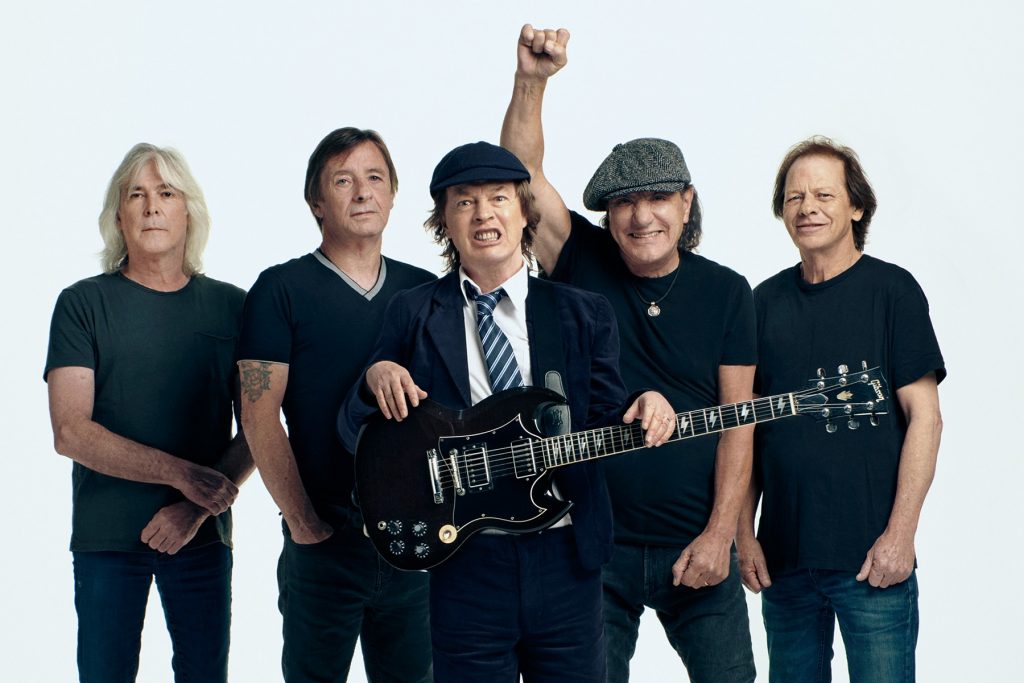
AC/DC Keep Riding the Highway to Hell on ‘Power Up’
For decades, AC/DC have defended their devil-horned crown as rock’s most stubborn band. They’ve survived deaths (singer Bon Scott in 1980, guitarist Malcolm Young in 2017) and dirty deeds (drummer Phil Rudd was placed on house arrest after threatening to kill a man). Yet, they remain eternally committed to their core values: rocking out, hailing Satan, and never going within an outback mile of a ballad. Hell, their most transgressive move ever was using the bagpipes on “It’s a Long Way to the Top,” and that was in 1975. That consistency is what their fans love about them and what their critics hate most.
But nothing has ever slowed down AC/DC on their journey down the Highway to Hell. And now they’re back again with Power Up, their umpteenth album of eardrum-shredding guitar terror and odes to raising hell. It’s their best record since 1990’s The Razors Edge, and yet again, they sound the same as they always have. Frontman Brian Johnson, who had to leave their last tour due to deafness, now has a special hearing aid so he can continue to sing, and Malcolm’s nephew, Stevie Young, plays rhythm guitar. Rudd has served his time and plays as steady as ever, and even Angus Young’s schoolboy outfit still fits snugly.
blogherads.adq.push(function () {
blogherads
.defineSlot( ‘medrec’, ‘gpt-dsk-tab-article-inbody1-uid0’ )
.setTargeting( ‘pos’, [“mid-article”,”mid”,”in-article1″,”mid-article1″] )
.setSubAdUnitPath(“music//article//inbody1”)
.addSize([[300,250],[620,350],[2,2],[3,3],[2,4],[4,2]])
;
});
Naturally, there are no real surprises here: Power Up sounds unapologetically like AC/DC, and Angus has likened the LP to a tribute to Malcolm the same way that Back in Black was a back-pew eulogy for Bon Scott. Many of the riffs, which came from Angus and Malcolm’s archive, recall their greatest hits — the sidewinding blooze of “Demon Fire” is a distant relative of “Whole Lotta Rosie”; the throbbing intro to “Witch’s Spell” harks back to “Who Made Who,” the riff on “Code Red” stutters like “Back in Black” — and Johnson’s voice still sounds like angry truck exhaust, whether he’s huffing about tearin’ up the highway on “Code Red,” snarking about “crystal balls” on “Witch’s Spell,” or prescribing sex three times a day (“or as much as you may”) as a depression cure to a woman on “Money Shot.”
Is “Systems Down,” about a furnace “about to blast,” a political metaphor? No way, it’s about a furnace that’s about to blast. Did anyone in the group blanche at the lyric, “If you reject me, I take what I want” on “Rejection”? No, because nobody has ever expected AC/DC to turn progressive. In fact, the crisply Xeroxed familiarity of the rockers’ rawness from album to album is what made them legendary, so there’s no point in intellectualizing it.
There is a small bit of introspect on the gentle (by AC/DC standards) rocker “Through the Mists of Time,” on which Johnson sings about “dark shadows on the walls.” But soon enough, he’s back yowling about “painted ladies,” and Young is whipping out another high-voltage blues solo. That’s what makes AC/DC great: No matter what they’ve gone through, they can only be themselves.
[Find the Album Here]




